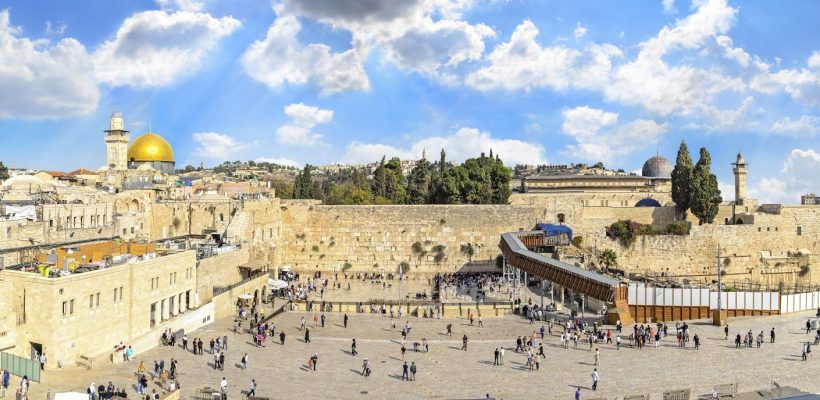
JERUSALEM HAS TAUGHT ME
By Fr. Rafiq Khoury
*Excerpted from Saliba Sarsar, ed. What Jerusalem Means to Us: Christian Perspectives and Reflections. North Bethesda, MD: Holy Land Books/Noble Book Publishing Incorporated, 2018.
**Father Rafiq Khoury was born in the Palestinian Christian village of Taybeh. A renowned Palestinian theologian and preacher, he specializes in Pastoral Theology and Catechism with the Patriarchal Diocese of Jerusalem. He holds a Ph.D. from the Lateran University in Rome, serves as a board member of the Al-Liqa’ Center for Religious and Heritage Studies in the Holy Land, and was the Secretary General of the Synod of the Catholic Churches of the Holy Land. Most of his writings are in Arabic, but among the titles of his works in English are “The History of Jerusalem: A Christian Perspective,” “The Palestinian People as a Theological Issue,” “Jesus Christ in Christian Faith,” “Identity: Meaning, Components, and Dimensions,” “The Theological Implications of the Current Situation in the Holy Land: From the Point of View of a Christian Palestinian,” “The Conflict of Narratives: From Memory to Prophecy,” “Living with the Cross,” Christian Theology in the Palestinian Context (edited with Rainer Zimmer-Winkel), and Noonday Stars (translated from Arabic by Saliba Sarsar).
Jerusalem has taught me that I can be a human being only with other human beings, that I can only be a Christian with other Christians, that I am a believer only with other believers.
Jerusalem has taught me to reconcile myself with my own memory without denying the memory of the other, to be attached to my Holy Places without excluding the Holy Places of the others. Jerusalem has taught me even to consider the Holy Places of the others as my own Holy Places and the feasts of the others as my own feasts.
Jerusalem has taught me that the world is a beautiful mosaic, one but with a variety of colors. Jerusalem has taught me the harmony between the one and the diverse. The one and the multiple are neither contradictory nor exclusive but that the one supposes the multiple and that the multiple is a prerequisite of the one.
Jerusalem has taught me that life is made of giving and receiving, where everyone has something to give and something to receive. What I give enriches the other and what I receive enriches me. It is between this giving and receiving that my humanity is shaped.
Jerusalem has taught me that my identity is not closed, but open, and that it is only completed if it is enriched by the identity of the other.
Jerusalem has taught me that peace and justice are inseparable. Both are divine predicates. To look for peace without justice is to cover flagrant injustices with a beautiful word.
Jerusalem has taught me that ecumenism, interreligious dialogue, and the dialogue of cultures and peoples place us, on the one hand, with our weaknesses and our sins and, on the other, with our responsibilities and our immense possibilities. Hence, they place us in front of our humanity. And Jerusalem is the proper place of it.
Jerusalem has taught me to enlarge the spaces of my conscience to become a universal conscience, without any borders and walls. I breathe in the universal, in order not to suffocate.
Jerusalem has taught me that relationship is a process of life or death, a Paschal process par excellence. In Jerusalem, one cannot live without dying, dying to the destructive aspects of our humanity to enable the energies of life in us.
Jerusalem has taught me that the relation with the other is decisive to build up my humanity. But Jerusalem has taught me also that this relation is a crucified one and that relation in an unfulfilled project, which demands from us a continuous spiritual struggle.
Jerusalem has taught me that love is essential for building up a human world and that love is always a crucified and unachieved reality, which can survive only by purifying itself incessantly.
Jerusalem has taught me to cross the borders of its quarters to meet on the other side with a hidden aspect of my humanity without which I remain unachieved. Jerusalem has taught me to transform walls into bridges.
Jerusalem has taught me that God is in every atom of its space and that God is not a tribal or a confessional God, but a merciful one, friend of every human being, of all human beings. Jerusalem has taught me that God is my way to humanity and humanity is my way to God.
Jerusalem has taught me to serve God, not to use Him, to do His will, not to submit Him to my instincts, to elevate myself to the highness of His holiness and not to lower Him to the misery of my sins.
Jerusalem has taught me that time and eternity are not contradictory. I tend towards eternity without forgetting my commitment in time, and I commit in time without forgetting eternity. Time and eternity are the two inseparable and complementary faces of human existence.
Jerusalem has taught me that the triangle that shapes our human identity is God – myself – the other. The three parts of this triangle are linked organically with each other. To aggress against one is to aggress against them all. I do not exist without the other and neither of us without God.
Jerusalem has taught me to look for the energies of life in me and around me to enhance them and to discover the forces of death in me and around me to fight them.
Jerusalem has taught me that the mystery of life is enclosed in an empty tomb, where lies the body of Who destroyed in his own body the dividing wall that separates the two communities so as to create one community.
